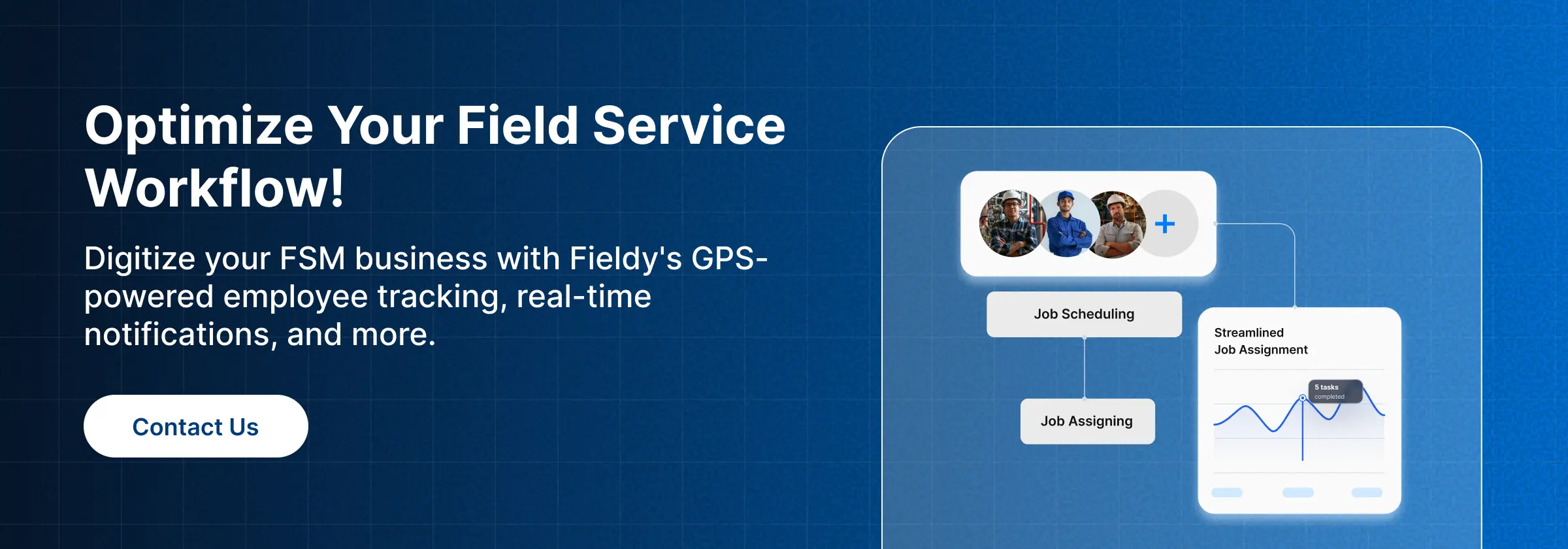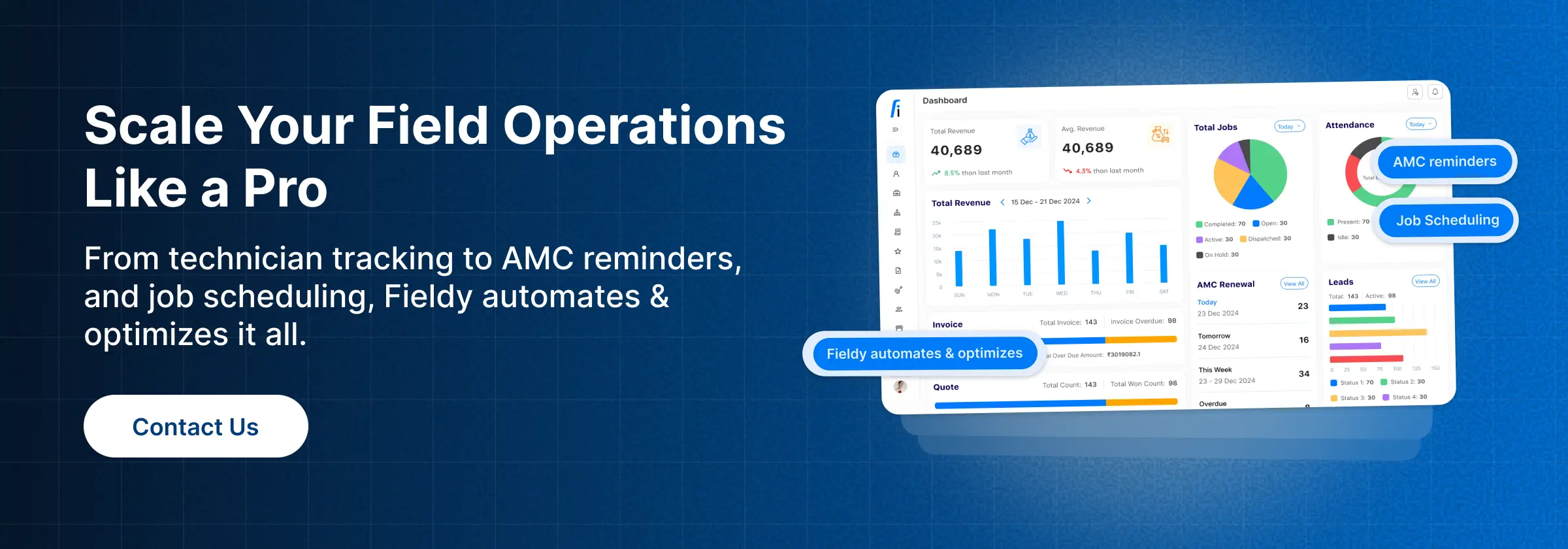🌍 Introduction
Field sales has always been much more than merely closing the sale; it has been about generating trust, nurturing relationships, and creating long-lasting value for the customer. But times have changed radically for operating field force teams. By 2026, mobile-first strategies will cease to be options; they will form the bedrock of sustainable sales growth, along with real-time visibility and automation.
There has been a surge in the global demand for the best field sales software. As per MarketsandMarkets, the field service management market is anticipated to grow from $5.2 billion in 2021 to over $8.6 billion by 2026 at a CAGR of more than 11%. This growth depicts a simple truth: customers want faster response time, personalized attention, and an uninterrupted experience through channels of their choice.
Unlike traditional CRM systems that focus mainly on storing customer data and pipeline management, field sales software is built with field teams in mind. It allows managers to monitor their salespeople’s positions, allows reps to operate offline, and provides territory mapping so that opportunities are not missed. In essence, it goes higher than merely managing prospects-it manages results in real time.
Here we list the 5 best field sales software for 2026, informing you about each one as well as why Fieldy remains unambiguously best for companies wishing to scale effectively.
⚠️ Why Businesses Need Specialized Field Sales Software
🚧 The Limitations of Traditional CRMs
The CRM is made to record customer interactions, track the stages of a deal, and provide some high-level sales reporting. However, this gives limited functionality for a field-based team. For example, the rep driving through multiple customer visits in a single day needs more than just viewing a deal position in the pipeline. They need:
- Easy routes using a routing engine to save time on traveling
- Offline-first solution for entering remote areas
- Instant generation of a job card for any new opportunity
- Lead assignment from territory-based to dilute overlapping
These are no longer “nice to have” features but basic ones that every business-owner expects. Amendment solely with CRMs leads to inefficiencies like a lack of follow-up, ambiguous visibility into team performance, less escalated customer experiences, etc.
📲 Why Field-First Platforms Matter in 2026
Field sales software fills these gaps with mobile-first capabilities, automated scheduling, GPS-enabled accountability, and integrations that keep teams connected. The result is higher productivity, faster deal cycles, and improved customer satisfaction.
To illustrate, a Harvard Business Review study found that companies using advanced sales technology saw a 17% increase in deal win rates compared to those using only basic CRM systems. This statistic highlights why the conversation in 2026 is no longer about whether to adopt technology, but which platform best fits your team’s needs.
And this is where Fieldy enters as a frontrunner, redefining how modern sales teams work.
🏆 Best Field Sales Software for 2026 – Ranked
1️⃣ Fieldy – The Clear Leader in Field Sales Software
Fieldy has quickly become the gold standard for businesses seeking field-first functionality. Unlike traditional field service CRM software or its extensions, Fieldy is designed from the ground up to empower reps in the field, not just managers at a desk.
What makes it unique is its blend of real-time intelligence and everyday usability. Sales managers can track rep locations with live GPS logs, ensuring accountability and better planning. At the same time, reps can continue working in full offline mode, syncing data once connectivity is restored, a crucial advantage in rural or remote territories.
- Automation is another strong suit.
- Features like auto lead routing ensure no lead is left unattended, while instant job card generation cuts down admin time so reps can focus on conversations, not paperwork.
- With no-code customizable forms, businesses can adapt Fieldy to their workflows without hiring expensive developers.
Perhaps the biggest differentiator is accessibility. Fieldy avoids heavy setup fees and long contracts, offering instant deployment and transparent pricing. This makes it equally valuable to a 10-person HVAC company as it is to a nationwide franchise selling medical devices.
Why it ranks #1: Fieldy’s ability to combine offline functionality, Live GPS tracking, automation, and affordability positions it as the best field sales software of 2026.
2️⃣ Salesforce Field Service
Salesforce remains a global powerhouse in sales technology, and its field service module builds on the strength of the Sales Cloud. It brings in features like Einstein AI for predictive insights, advanced sales forecasting, and deep integration with marketing and service tools.
However, Salesforce often proves overwhelming for small and mid-sized teams. Licensing fees can escalate quickly, and customization typically requires dedicated IT resources or costly consultants. For enterprises already invested heavily in the Salesforce ecosystem, it makes sense. But for growing businesses, the learning curve and costs are significant barriers.
Best for: Large-scale enterprises with the budget and technical resources to leverage the full Salesforce suite.
3️⃣ ServiceTitan
ServiceTitan is widely recognized in industries like plumbing, HVAC, and electrical services. It excels in enterprise-level reporting, workflow management, and customer communications. Its features are particularly suited to service-heavy businesses that require detailed operational oversight.
The downside is its pricing and complexity. With monthly costs often running into thousands of dollars, many SMBs find it prohibitive. The onboarding process is also extensive, making it better suited to organizations that can dedicate time and resources to training.
Best for: Enterprise service businesses that prioritize comprehensive reporting and have the budget to invest heavily.
4️⃣ Jobber
Jobber’s main appeal is simplicity. It provides a clean interface, reliable scheduling, and invoicing tools that work well for small service teams. For businesses just beginning their digital journey, it’s a straightforward way to move away from spreadsheets.
Yet, Jobber’s limitations become evident as teams scale. The lack of offline support, limited automation, and absence of real-time GPS tracking make it difficult for larger teams or those covering wide territories. As a result, businesses often outgrow Jobber and migrate to more robust platforms like Fieldy or Salesforce.
Best for: Small teams needing basic scheduling and customer management.
5️⃣ Zoho FSM
Zoho FSM builds on the strength of the already popular Zoho CRM ecosystem, extending its capabilities with field service features. For businesses that are already invested in Zoho’s suite of tools, whether that’s Zoho CRM, Zoho Books, or Zoho Desk, this solution feels like a natural extension. Its biggest advantage lies in its affordability and native integration across Zoho’s products, allowing businesses to manage sales, customer service, and finance within a single ecosystem.
That said, when compared with purpose-built field sales software, Zoho FSM shows its limitations. It leans more toward being a CRM-centric tool than a dedicated, field-first platform. To put it simply:
- Strengths: Affordable pricing, seamless integration with Zoho tools, and easy adoption for businesses already in the ecosystem.
- Limitations: Lacks advanced GPS tracking, route optimization, and robust offline functionality needed by modern field teams.
- Best Use Case: Cost-sensitive SMBs that want light field service features without switching away from Zoho.
Because of these trade-offs, teams that rely heavily on mobility and real-time visibility may find Zoho FSM less effective than platforms like Fieldy or Salesforce Field Service. Still, for businesses seeking a budget-friendly entry point, it provides a practical solution without overwhelming complexity.
🌟 Why Fieldy Outshines the Competition
While Salesforce offers enterprise depth, ServiceTitan delivers operational detail, Jobber keeps it simple, and Zoho provides affordability, Fieldy uniquely combines all of these benefits in a single package designed for the realities of field sales.
- Fieldy vs Salesforce: Fieldy is lighter, faster to deploy, and more affordable.
- Fieldy vs ServiceTitan: Fieldy provides automation and GPS intelligence without the enterprise-level costs.
- Fieldy vs Jobber: Fieldy offers scalability and offline access, ensuring teams don’t outgrow it.
- Fieldy vs Zoho: Fieldy delivers field-first features like job cards and territory routing that go beyond CRM.
In essence, Fieldy is not just another software option; it’s a strategic enabler for sales growth in 2026.
🏁 Final Verdict
As businesses prepare for the challenges of 2026, the need for smarter, more agile field sales solutions has never been clearer. Fieldy stands out not just because of its features, like real-time live GPS tracking, offline functionality, and automation, but because it removes the usual barriers of cost, complexity, and steep learning curves.
It allows sales reps to focus on what they do best: building relationships and closing deals, while the platform quietly takes care of scheduling, lead routing, and reporting in the background. Whether you’re a growing SMB or a large enterprise with distributed teams, Fieldy adapts to your needs, scaling effortlessly as your business grows.
Ready to see the difference? Try Fieldy today and experience how the best field sales software of 2026 can help your teams work smarter, close faster, and grow stronger.
❓FAQs
What’s the difference between field sales software and CRM software?
A: Field sales software goes beyond CRM by adding offline access, GPS tracking, and territory management. This makes it better suited for field reps who need real-time, on-the-go tools rather than just customer record storage.
Is Fieldy suitable for both SMBs and large enterprises?
A: Yes, Fieldy’s scalable design supports SMBs with limited resources and enterprises managing nationwide teams. Its flexibility ensures both affordability and enterprise-grade functionality.
How does offline capability benefit field reps?
A: Offline mode lets reps log visits, update leads, and create job cards without internet connectivity. Data syncs automatically later, ensuring no information is lost in remote areas.
What’s the ROI of adopting field sales software?
A: Companies using dedicated field sales software see 20–30% higher productivity and faster deal closures. Automation and real-time insights help sales teams work smarter and close deals quickly.
Why is Fieldy ranked higher than Salesforce or ServiceTitan?
A: Fieldy balances enterprise-grade power with SMB accessibility, offering GPS, automation, and offline features. Unlike Salesforce or ServiceTitan, it delivers these benefits at a fraction of the cost and complexity.




